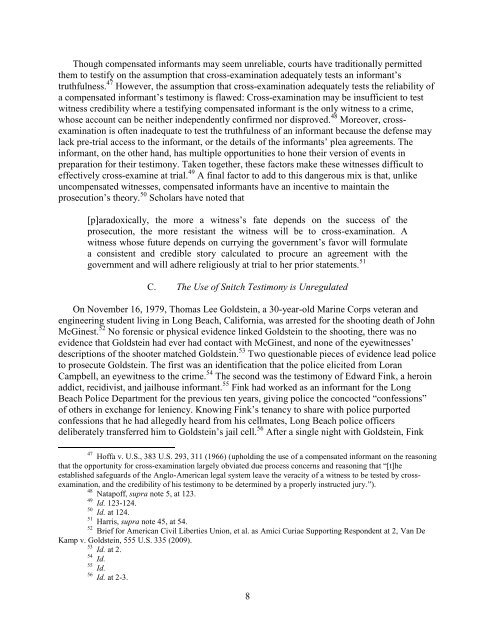attachment_id=996 - UDC Law Review
attachment_id=996 - UDC Law Review
attachment_id=996 - UDC Law Review
You also want an ePaper? Increase the reach of your titles
YUMPU automatically turns print PDFs into web optimized ePapers that Google loves.
Though compensated informants may seem unreliable, courts have traditionally permitted<br />
them to testify on the assumption that cross-examination adequately tests an informant’s<br />
truthfulness. 47 However, the assumption that cross-examination adequately tests the reliability of<br />
a compensated informant’s testimony is flawed: Cross-examination may be insufficient to test<br />
witness credibility where a testifying compensated informant is the only witness to a crime,<br />
whose account can be neither independently confirmed nor disproved. 48 Moreover, crossexamination<br />
is often inadequate to test the truthfulness of an informant because the defense may<br />
lack pre-trial access to the informant, or the details of the informants’ plea agreements. The<br />
informant, on the other hand, has multiple opportunities to hone their version of events in<br />
preparation for their testimony. Taken together, these factors make these witnesses difficult to<br />
effectively cross-examine at trial. 49 A final factor to add to this dangerous mix is that, unlike<br />
uncompensated witnesses, compensated informants have an incentive to maintain the<br />
prosecution’s theory. 50 Scholars have noted that<br />
[p]aradoxically, the more a witness’s fate depends on the success of the<br />
prosecution, the more resistant the witness will be to cross-examination. A<br />
witness whose future depends on currying the government’s favor will formulate<br />
a consistent and credible story calculated to procure an agreement with the<br />
government and will adhere religiously at trial to her prior statements. 51<br />
C. The Use of Snitch Testimony is Unregulated<br />
On November 16, 1979, Thomas Lee Goldstein, a 30-year-old Marine Corps veteran and<br />
engineering student living in Long Beach, California, was arrested for the shooting death of John<br />
McGinest. 52 No forensic or physical evidence linked Goldstein to the shooting, there was no<br />
evidence that Goldstein had ever had contact with McGinest, and none of the eyewitnesses’<br />
descriptions of the shooter matched Goldstein. 53 Two questionable pieces of evidence lead police<br />
to prosecute Goldstein. The first was an identification that the police elicited from Loran<br />
Campbell, an eyewitness to the crime. 54 The second was the testimony of Edward Fink, a heroin<br />
addict, recidivist, and jailhouse informant. 55 Fink had worked as an informant for the Long<br />
Beach Police Department for the previous ten years, giving police the concocted “confessions”<br />
of others in exchange for leniency. Knowing Fink’s tenancy to share with police purported<br />
confessions that he had allegedly heard from his cellmates, Long Beach police officers<br />
deliberately transferred him to Goldstein’s jail cell. 56 After a single night with Goldstein, Fink<br />
47 Hoffa v. U.S., 383 U.S. 293, 311 (1966) (upholding the use of a compensated informant on the reasoning<br />
that the opportunity for cross-examination largely obviated due process concerns and reasoning that “[t]he<br />
established safeguards of the Anglo-American legal system leave the veracity of a witness to be tested by crossexamination,<br />
and the credibility of his testimony to be determined by a properly instructed jury.”).<br />
48 Natapoff, supra note 5, at 123.<br />
49 Id. 123-124.<br />
50 Id. at 124.<br />
51 Harris, supra note 45, at 54.<br />
52 Brief for American Civil Liberties Union, et al. as Amici Curiae Supporting Respondent at 2, Van De<br />
Kamp v. Goldstein, 555 U.S. 335 (2009).<br />
53 Id. at 2.<br />
54 Id.<br />
55 Id.<br />
56 Id. at 2-3.<br />
8














